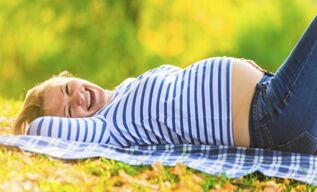研究发现 产后抑郁或与孕晚期日照不足有关
A just-published study has found an interesting association between pregnant womens' exposure to natural daylight and their susceptibility to postnatal depression (PND).
一份最新研究发现,孕期自然光照多少与她们患产后抑郁(PND)的几率之间存在着有趣的联系。
"Women in late pregnancy during darker months of the year may have a greater risk of developing postpartum depression once their babies are born," Science Daily reports.
据《每日科学》网站报道,孕晚期处于一年中光照较少月份的女性,在婴儿出生后患产后抑郁的风险较大。

"This is consistent with what is known about the relationship between exposure to natural light and depression among adults in the general population."
“这与自然光照多少与一般人群中成年人患抑郁几率大小之间的已知联系相符。”
Dr Deepika Goyal of San José State University was lead author on the study, which was just published in the Journal of Behavioral Medicine.
该研究发表在英国《行为医学杂志》上,主要作者是美国州立圣何塞大学的迪皮卡·戈亚尔。
Dr Goyal and her team looked at 293 Californian first-time mums, analysing the amount of daylight they were exposed to during the final trimester of their pregnancy. They also looked at each woman's history of depression, her age, her socioeconomic status and how much she slept.
戈亚尔博士和她的团队观察了加州293名初产产妇,分析了她们在怀孕最后三个月接受光照的时间。此外,他们还研究了每位女性的抑郁史、年龄、社会经济地位以及睡眠时长。
They found that the lowest risk for depression (26 percent) was seen in women whose final trimester coincided with seasons with longer daylight hours.
他们发现,患抑郁症风险最低(26%)的女性,她们的孕晚期时间正是白昼时间较长的季节。
The depression risk was highest (35 percent) in women whose final trimester coincided with days with fewer daylight hours. These womens' depression-related symptoms were more severe following the birth of their babies.
患抑郁症的风险最高(35%)的女性,孕晚期时间正是白昼时间较短的季节。这些女性的抑郁相关症状在产后更加严重。
The findings have lead to some specific recommendations for women who are prone to depression or are due to deliver in months when the daylight hours are fewer (like Winter).
这一发现为那些容易抑郁或是将要在日照较少的季节里(比如冬天)分娩的女性提供了一些具体的建议。
"Women should be encouraged to get frequent exposure to daylight throughout their pregnancies to enhance their vitamin D levels and to suppress the hormone melatonin," Dr Goyal said.
戈亚尔博士表示:“应鼓励高风险孕妇多接受自然光照以及摄入维生素D,并抑制褪黑激素。”